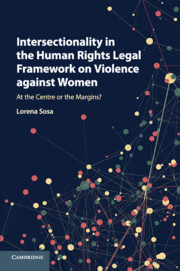 Intersectionality in the Human Rights Legal Framework on Violence against Women
Intersectionality in the Human Rights Legal Framework on Violence against Women 8 - Conclusion
from IV - Conclusion
Published online by Cambridge University Press: 25 October 2017
Summary
The greatest thing in this world is not so much where we stand as in what direction we are moving.
J. W. von GoetheExploring Intersectionality
The incorporation of intersectionality within the human rights framework on Violence against Women (VAW) implies the recognition of the diversity of women and their different experiences of violence, challenging essentialist views of gender. In addition to the strong symbolic meaning that such recognition would carry, there are many expectations regarding its theoretical and practical potential to include all women and ensure the full enjoyment of their human rights. This book wishes to contribute to the debates in the ongoing process of incorporation of intersectionality within the international human rights framework on VAW. It entails a double analysis. On one hand, it has theoretically explored the human rights framework on VAW from the perspective of intersectionality, revealing to what extent intersectionality is explicitly and/or implicitly incorporated in norms and what are the consequences for States. On the other hand, it empirically applied an intersectional approach in two case studies, revealing gaps in legislation and policies.
Intersectionality is discussed in relation to VAW from a theoretical perspective. It is presented in Chapter 2 as an explicit interdisciplinary approach to the study of race, gender, class and other social categories of distinction which can be used for the interpretation of human rights, particularly in relation to violence against women. The overarching notion promoted by intersectionality is that individuals (and groups) are affected by multiple forms of subordination based on multiple grounds of distinction, rather than by discrimination based on one single ground at a time. Three core theoretical propositions of intersectionality were identified. Firstly, intersectionality predicates the socio-structural nature of inequality. The unequal positioning of individuals and groups relates to categories used to distinguish and differentiate among them. The second proposition of intersectionality, closely related to the first, is that the construction of the social categories goes beyond the level of the (personal) identity to that of the structural. Finally, intersectionality suggests that multiple categories of distinction do not simply add to each other to create a multiplied effect, but that a new and different situation of subordination is created.
- Type
- Chapter
- Information
- Intersectionality in the Human Rights Legal Framework on Violence against WomenAt the Centre or the Margins?, pp. 249 - 264Publisher: Cambridge University PressPrint publication year: 2017


